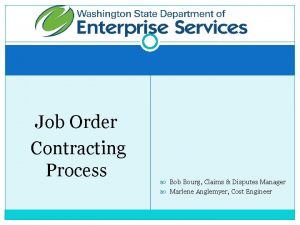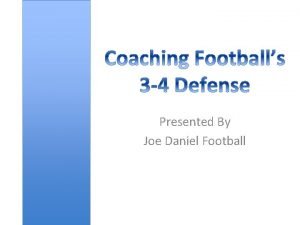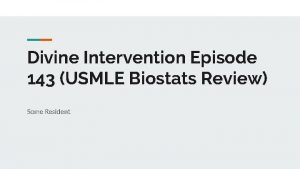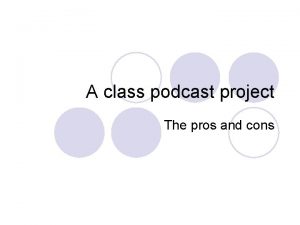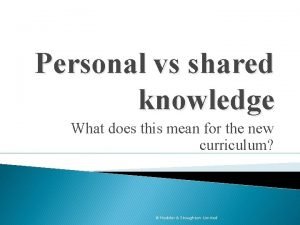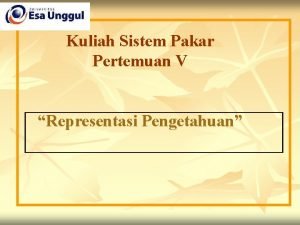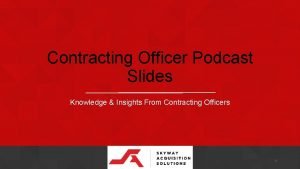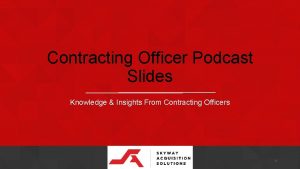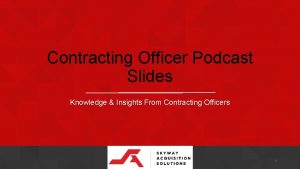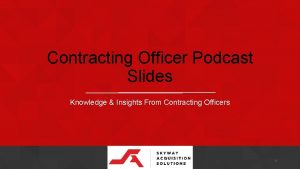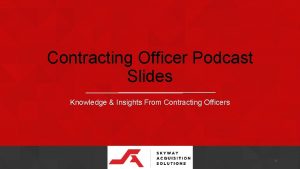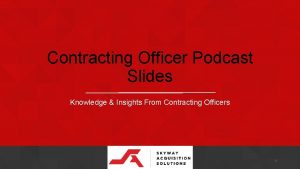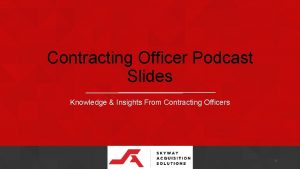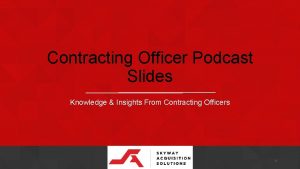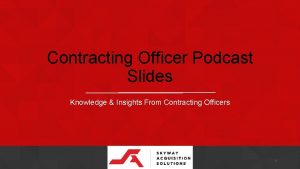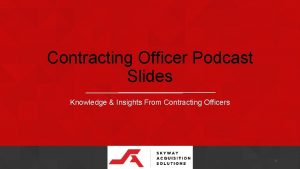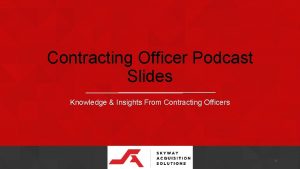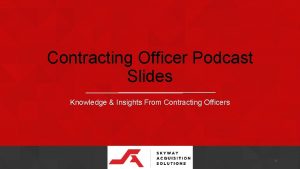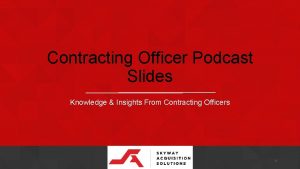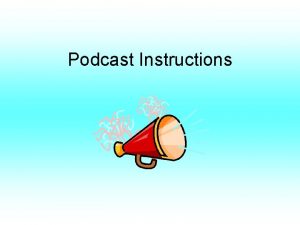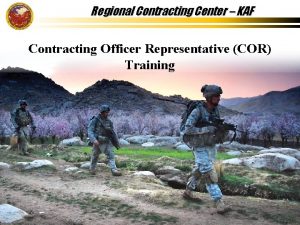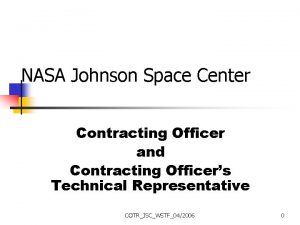Contracting Officer Podcast Slides Knowledge Insights From Contracting


















- Slides: 18

Contracting Officer Podcast Slides Knowledge & Insights From Contracting Officers 1

Episode 020 What are Proposal Schedules? Original Air Date: March 29, 20165 Hosts: Kevin Jans & Paul Schauer 2

Formatting notes • Hyperlinks: Blue font indicates hyperlinks – presentation must be in ‘Slide Show’ mode to activate the link • Red bold font indicates a point of emphasis • Green bold font indicates CO’s personal comment or perspective 3

Introduction • How much time does Industry need to prepare and submit a proposal? • What do they do with this time? 4

FAR 5. 2 – Synopses of Proposed Contract Actions • Synopsis: • Agency must transmit a notice of proposed action (in GPE, or Government Point of Entry – currently Fed. Biz. Opps, or FBO) 15 days before solicitation or proposed sole-source RFP (FAR 5. 203(a)) • If using FAR Part 12, CO may • 1) shorten the time, or • 2) combine the synopsis and solicitation (FAR 12. 603) 5

FAR 5. 2 – Synopses of Proposed Contract Actions • RFP: • CO must give a reasonable opportunity to respond for actions estimated to be greater than $25, 000 (FAR 5. 203(b)) • CO should consider the circumstances of the individual acquisition, such as the complexity, commerciality, availability, and urgency, when establishing the solicitation response time. (FAR 5. 203(b)) • Unless under FAR 12 Commercial, agencies shall allow at least 30 days to respond to RFPs for contracts expected to exceed SAT ($150 k) 6

FAR 5. 2 – Synopses of Proposed Contract Actions • Commodity vs. System acquisition • Commodity generally means less time • Custom application might mean more time • Complex system acquisition • Lots of time, unless… • Beefy RFI, DRFP, Industry collaboration: they know exactly what you want and have been writing to that point already 7

FAR 5. 2 – Synopses of Proposed Contract Actions • Commercial/Catalog price vs. Cost Buildup • If the price is already established, less time • If Industry must submit CCPD (Certified Cost & Pricing Data), requires more time • If Industry must use many Government-supplied templates, even longer • They have to ‘shoehorn’ it in to fit the template • Hint: they have to price it twice 8

Why does Industry need more (or less) time? • How much info does the Government need? • How long have they had to ‘think’ about it? • How much are they ‘quoting’ vs. ‘creating’? • How much ‘pre-RFP time’ did they get? • When in doubt, ask: • It may be less than you think! 9

When do Proposal Schedules happen? • Acquisition Time Zones (from Podcast Episode 003) • Execution Time Zones (from Podcast Episode 084) • Requirements Zone • Kick Off Zone • Market Research Zone • Performance Zone • RFP Zone (proposal zone) • Re-compete Zone • Source Selection Zone • Wrap-up Zone 10

Why are Proposal Schedules important? • Need to understand how much work is involved when developing the schedule • Try to find the best timeframe – avoid allowing too much or too little time • Industry needs to understand the requirement and the schedule – do not waste time 11

Why Should Government Care? • Too little time means you may get • Lower quality proposals • Offerors ‘guessing’ because they do not have time to ask questions • Claims of ‘favoritism’ • Overtime work due to ‘time crunch, ’ which drives up proposal costs (that show up in overheads) • There will always be overtime, so even more due to burnout factor 12

Why Should Government Care? • Too much time means you may: • Unnecessarily delay your acquisition schedule • Add cost to proposals…. contractors will use all the time allotted whether they need it or not • Receive even more proposals because more people ‘stumble’ upon the RFP • Solution: Spend more time in Market Research (Episode 013) • Solution: Spend more time on RFI and DRFP (Episode 008) 13

Why Should Industry Care? • Too little time for the information requested leads to: • Herculean efforts: nights, weekends, holidays • Lower quality, errors, incompleteness, brain-dead employees • Increased cost due to overtime, etc. (overtime is a myth in a salaried world) • Tunnel vision that impacts the ‘rest of the business’ 14

Why Should Industry Care? • Too much time can lead to: • Overspending (will use all time available) • This is a choice, a bad one. • It is not CAUSED by too much time • It is just poor judgment – but it happens all the time • “I hope they only give us 30 days instead of 45 days so I don’t spend too much time” 15

Why Should Industry Care? • People can avoid ‘overspending’ their time, but they do not • Overthinking • Procrastination and “just one more change” • Or maybe, … really, really good proposals • Solution: Target your opportunities carefully • Do not propose above your weight class (so you know what you are signing up for) 16

Summary • FAR 5. 2 requires at least 30 days (unless FAR 12 Commercial) • Too much time causes problems, as does too little • CO must analyze to determine the best timeframe • Market Research • RFIs and Draft RFP • Industry must carefully manage the time allotted – they will use it all, but must not waste it 17

Contact us • We are on Linked. In, Twitter and Facebook • We also started the Government Contracting Network Group on Facebook. Join us there! • Send your topics to paul@Contractingofficerpodcast. com • For Community support, contact Shelley Hall at shelley. hall@skywayacquisition. com 18
 Contracting officer podcast
Contracting officer podcast Chief contracting officer
Chief contracting officer A small child slides down the four frictionless slides
A small child slides down the four frictionless slides Starting from rest a marble first rolls down
Starting from rest a marble first rolls down Chief knowledge officer responsibilities
Chief knowledge officer responsibilities M audio podcast factory
M audio podcast factory Joe daniel football podcast
Joe daniel football podcast Hr2 hörrätsel
Hr2 hörrätsel The openblend podcast
The openblend podcast Focus 3 podcast
Focus 3 podcast Divine intervention episode 95
Divine intervention episode 95 Podcast project class 12
Podcast project class 12 For adults only podcast hindi
For adults only podcast hindi Podcast storyboard examples
Podcast storyboard examples Knowledge creation and knowledge architecture
Knowledge creation and knowledge architecture Knowledge claim
Knowledge claim Contoh shallow knowledge dan deep knowledge
Contoh shallow knowledge dan deep knowledge Gertler econ
Gertler econ Knowledge shared is knowledge squared meaning
Knowledge shared is knowledge squared meaning
